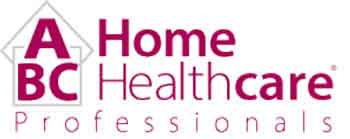As we age, the number of prescriptions we take often increases. Each medication on its own has a specific task, but when combined with other medications it may have an adverse effect. If you take several medications, and see more than one doctor it’s crucial that you know and communicate to them all the medications you take.
The best way to ensure that you communicate all your medications is by documenting them on a medication record. This can be a notebook that you carry in your purse or pocket, or a small wallet card such as the ones that are provided by ABC Home Healthcare to their clients.
Write. Update. Communicate.
Write each drug and dose in your medication record. Don’t forget any over the counter medicines such as vitamins and minerals, herbal supplements, cough and cold / allergy medicines, aspirin, pain and fever, topical, laxatives, etc. Update your information as things change. Keep your Medication Record with you and show this information to your doctor and pharmacist at every visit to ensure there are no conflicting medications. Remember, the better you communicate with your doctor and your pharmacist, the better they can ensure that you have the best medication for your needs.
What else can I do to help?
It is important to keep the lines of communication open with your doctor and pharmacist. Talk to them when you are prescribed a medication or any time you purchase an over the counter medication to gain a clearer understanding of what it is, what to expect and how it may react with any of your current medications.
Some questions for your doctor:
- Is this medication the brand name or generic?
- What does the medication do?
- How will I know it is working?
- When should I start feeling better?
- What should I do if I miss a dose?
- When do I stop taking this medication?
- Does this medication replace any of the medicines I currently take?
Some questions for the pharmacist:
- What is the name of the medication if different than what your doctor discussed with you?
- Are there any side effects?
- Do I need to avoid any activities or certain foods while taking the medication?
- How will this medication interact with the medicine I currently take, including over the counter and herbal remedies?
Don’t be afraid to ask a question and speak up.
- Have you noticed a change in the appearance of your medication?
- Did you have a reaction to the medication?
- Do you understand what you’re taking and why?
Not only is it OK to ask questions, it is important and can help keep you safe.
Remember to also check the expiration dates of your medications. Medications past their date of expiration should be discarded properly. Many cities and towns have hazardous waste days during which you may dispose of them. You can also ask your pharmacist.
ABC Can Help
You play the biggest role in your medication management. If at any point in time you feel you are unable to manage this safely on your own, give an agency like ABC Home Healthcare a call. ABC Home Healthcare is here to help keep you safe with their Medication Management Program.
Having an experienced Nurse Case Manager manage your medication can help ensure:
- All current medication is documented and available for review
- You have a clear understanding of each prescription
- The right medications are taken at the right time
- Any reactions or allergies to medication is clearly communicated and documented
If you would like to learn more about medication safety or our Medication Management program, call ABC Home Healthcare at 781-245-1880.

